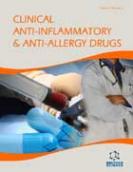Abstract
The study aimed to investigate antiallergic potential of methanol extract of aerial parts of Lantana camara L. (Verbenaceae) in animal models of allergy. The test extract (MLC) was screened for mentioned activity using compound 48/80 induced systemic anaphylaxis, mast cell degranulation, milk induced leukocytosis and eosinophilia in mice at different doses (100, 200 and 400 mg/kg, p.o.). Standard used in the study was disodium chromoglycate (10 mg/kg, i. p.). Isolated goat tracheal chain preparation was used to assess antihistaminic activity. Phytochemical studies of MLC revealed presence of saponins (26.32%), flavonoids (7.8%), and alkaloids. Treatment with MLC significantly protected systemic anaphylaxis induced by compound 48/80 as indicated by decreased mortality in MLC treated groups. There is significant protection against mast cell degranulation in MLC treated animals. MLC also showed significant protection milk induced leukocytosis and eosinophilia. Rightward shift of dose-response curve of histamine in presence of MLC showed antihistaminic property. The antiallergic activity of MLC was attributed to the presence of saponins and/or flavonoids.
Keywords: Antiallergic, antihistaminic, eosinophilia, lantana camara, mast cell degranulation.
Graphical Abstract
 9
9

